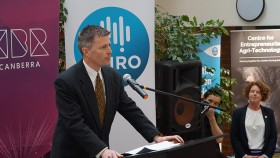Gavin Huttley
Group research focus
The lab is dominantly focussed on developing statistical and computational techniques for the examination of genetic variation. In particular, we seek to understand processes that affect mutation. Understanding how to best model mutation is a critical precursor to identifying the operation of natural selection in the distribution of genetic variation.
Research achievements
We have demonstrated that the compaction of DNA into chromatin likely underpins the observation of an oscillation (along a DNA sequence) of genetic divergence, and thus mutation.
In our efforts to model the influence of neighbouring bases on mutation we exposed a serious flaw in a widely used model for detecting the occurrence of natural selection. We devised a new model that fixes the identified flaw and exhibits very robust performance.
We have shown that a common assumption - substitutions are time-reversible - systematically biases estimates of genetic distance. This problem impacts on all analyses that utilise genetic distances, when the evolution of the DNA sequences being considered violates this assumption. Unfortunately, that violation appears to be quite common.
What do you enjoy most about teaching, and what is your focus?
The focus of my teaching is to help students develop their statistical and computational thinking. What I enjoy is seeing students use these skills to think critically and, ultimately, draw robust conclusions.
What do you see as challenges for your field of research?
Driven by stunning advances in our capacity to generate data there is an increasing reliance, across all of science, on computing and statistical analysis of large data. Numerous challenges result. One is that the scale of these data sets is exposing serious flaws with models whose application is widely entrenched. Recognising and "fixing" these flaws is essential. Another challenge concerns training the next generation of biologists. Training them as highly skilled biologists while also providing them with sufficient training in statistics and computing is essential if they are to realise the opportunities opened up by these technological advances.
- This profile originally appeared in the RSB newsletter, issue 75, May 2016.
- Huttley group - Bioinformatics, molecular evolution of genomes.












